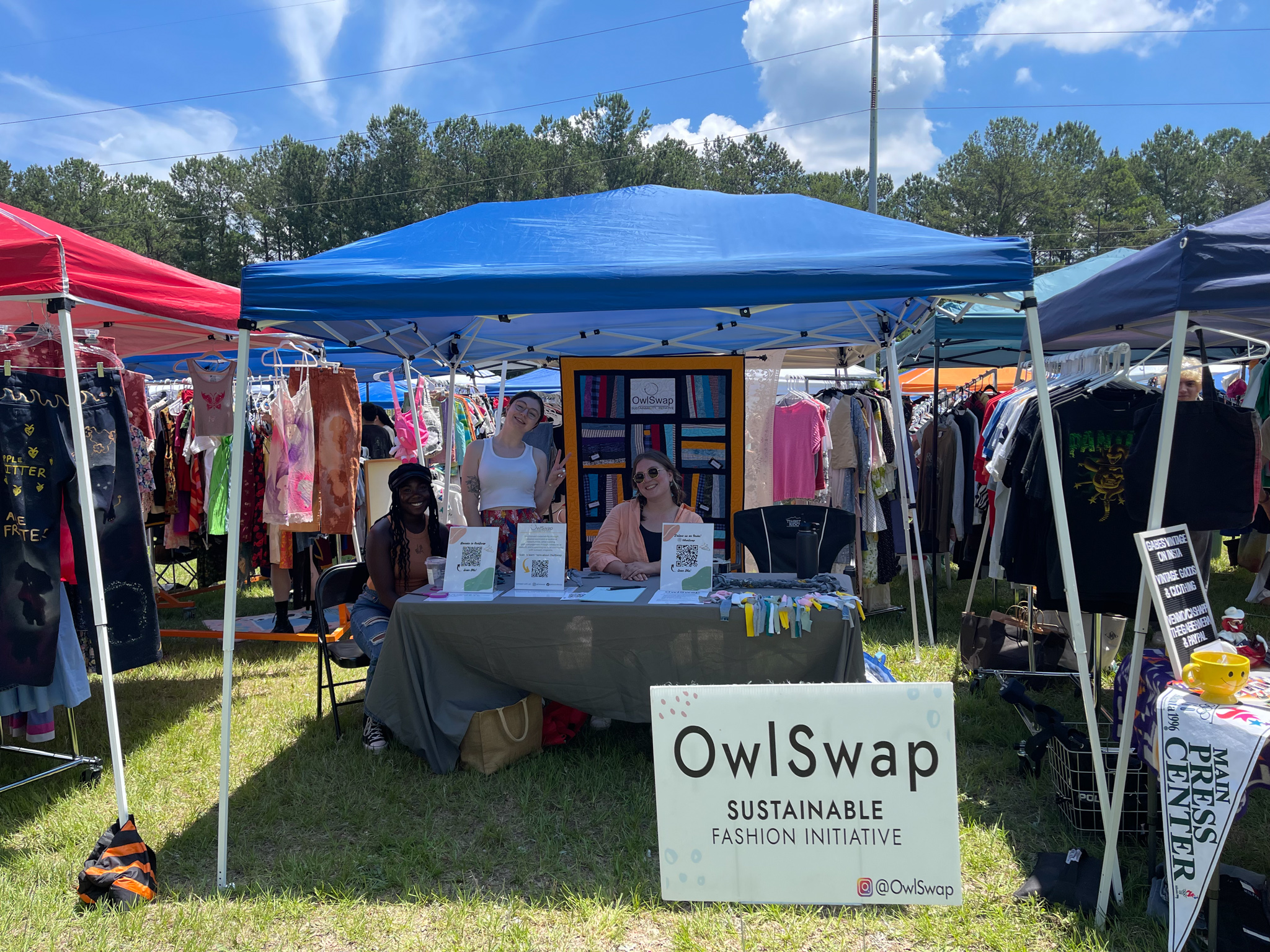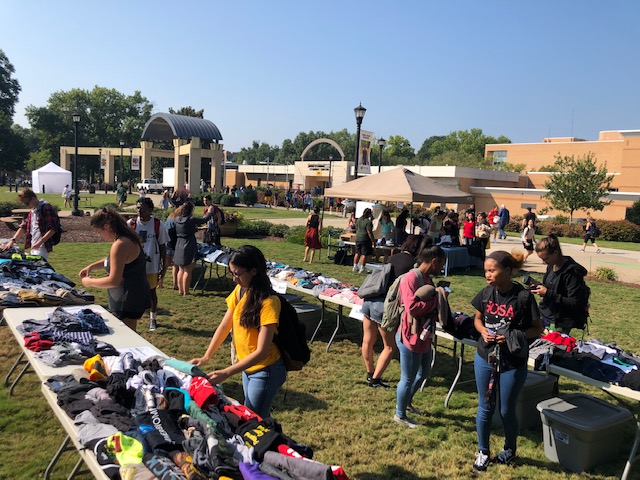Between 2003 and 2018, the number of times a person would wear the same piece of clothing multiple times has gone down by 36%.1* This is, in part, due to the dramatic increase in the fast fashion industry. Despite its negative environmental impact, many times it ends up being one of the few ways those on lower incomes can afford new clothing. This is especially true for college students who are often on very tight budgets. It might be easier to buy a cheap new shirt rather than fixing the hole in the old one.
Enter OwlSwap, Kennesaw State University’s own clothing sustainability program.
OwlSwap is an educational sustainability program aimed at teaching students how they can make a difference with their clothing. OwlSwap started in 2018 in a Geography of Clothing class (now known as Geography of Sustainable Fashion) taught by Dr. Jason Rhodes. Originally a student project for the class, it was the creation of Britt Pickering and her groupmates with the goal of combatting a very complex global issue on a local level. It has now evolved into a program/club that runs two clothing closets (and various sustainability focused events) on Kennesaw State’s two campuses, with one on the Marietta, GA campus and one on the Kennesaw, GA campus.
One of the ways OwlSwap educates students about sustainability is through their Instagram (@owlswap) by teaching others “what is sustainable fashion?” and “what is fast fashion?” as well as giving tips on how to implement sustainable practices towards your clothes to make them last longer. Stephanie Forero-Rodriguez, a student employee at the Kennesaw campus closet, credits OwlSwap for teaching her several mending techniques for clothing as well as how to sew a button. Current OwlSwap director Maria Anastasi added that in addition to mending, they also show students how to make something new out of something old. For instance, they have had workshops on how to make a dog toy, a tote bag from an old t-shirt, and even how to make a macramé plant-hanger. OwlSwap doesn’t just teach sewing techniques, however. Being a largely student run organization means that the students oversee managing the numerous events held throughout the year. Stephanie credits involvement in these events with teaching her project management as well as marketing and design skills. Lilly Colantuono mentions that a key point when discussing OwlSwap is that it is not just a closet, and that sustainability is interdisciplinary. She highlights this point to make the program more appealing to a wider demographic since she feels mentioning that “It’s a closet where you ‘shop’,” tends to lean more towards a female audience in appeal and they want everyone to participate.
Getting involved with OwlSwap is an easy process. OwlSwap is a small team, so teamwork and a welcoming and open environment are another key aspect they mention that holds them together. Lilly started by making a commitment to volunteer every Wednesday and eventually it grew into her getting a job at OwlSwap’s Marietta campus closet. The team has a group chat that anyone who is interested in the program can join; they frequently drop volunteer opportunities there for them to see. They also offer internship opportunities to students. KSU students are encouraged to donate any clothes they don’t want any more to OwlSwap by dropping them in the donation bins located on each campus. From there the clothing is sorted by volunteers and is either brought into the campus closet or donated to a local non-profit.
So how would a student go about being a “customer” to OwlSwap? One way is to shop on their clothing Instagram (@Owlswapcloset). The closets will post pictures and students can claim the items for pickup. They can also shop in person, or attend a Clothing Swap, all of which are free since they never charge students for the clothes. Through some of OwlSwap’s partners, they are able to provide discreet clothing drop-offs for those in situations that prevent them from being able to access the clothing otherwise.
OwlSwap Closet has another focus when helping students, beyond providing casual clothing, with their “Dress for Success” program. Lilly mentions the Marietta campus is more business attire focused since they have a close relationship with the Department of Career Planning and Development. They are always happy to help these students find the perfect attire for an interview that matches both the students’ style and the business setting they will enter. However, they still have plenty of clothes for any event, whether it’s going to brunch or attending an interview. There are several other programs that they offer that aren’t just related to thrifting clothing. They also host movie nights, have a sustainability focused book club, and participate in textile recycling via a partnership with Re:loom.
Re:loom is a unique program that employs formerly homeless and low-income individuals to weave old textiles and clothing into new items. The partnership began in 2019 when KSU’s new president changed the school’s previous logo, the school’s name with the silhouette of Kennesaw Mountain in the back, to a new one. School policy requires that all items bearing the old logo could not be displayed. What resulted was a purge of thousands of pounds of items ranging from t-shirts to tablecloths. Instead of the items ending up in a landfill, OwlSwap was able to send these textiles to Re:loom and they created products that were made with school colors. You can visit the store here.
Alongside the birth of OwlSwap in 2018 came the partnership with BRAC University and together they worked with the Awaj Foundation to conduct a series of interviews to give garment workers in Bangladesh a platform to share their voice. They continue to raise awareness about the issues and conditions these people work in by regularly sharing their photos and quotes at events. Lilly, who had recently taken Dr. Rhodes’ class, explains they had conducted semester long interviews with university students in Bangladesh who would give them constant information of the day-to-day happenings in the garment industry over there. She credits it to being a very eye-opening experience since part of the focus was unlearning preconceptions of the country and its people as well as being put face-to-face with what they were going through.
When asked “What is one thing you would like everyone to know about OwlSwap?”
Lilly answered that “It’s more than just clothing, there’s so many different skills we are able to share with everybody. I’ve had people come in and share that they need to update their resume for this and I’m like Oh! I’d be able to help you with that. It’s a great place for students to come in and interact with each other and network.”
Maria answered “OwlSwap is predominantly run by students and is very much focused on students. Like Lilly said, we’re friendly and can help you with a variety of things.”
Stephanie answered “I would say OwlSwap is a hidden gem in Kennesaw. Not a lot of people know about it but those who do create such a great community and I love being a part of it. I want so many other people to be a part of this. Being a college student is hard and it’s so rewarding to be able to help other students out with clothing insecurity.”
Through the efforts of its participants OwlSwap is able to provide an eco-friendly solution to students who may be facing clothing related insecurity.
Sources
1*27 Revealing Fast Fashion Statistics for 2022 (fashiondiscounts.uk)
OwlSwaps Programs – Sustainability (kennesaw.edu)






